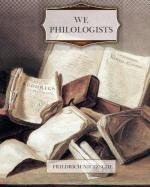These educators would now be hauled before the tribunal, and among them an entire profession would be observed . the philologists. This profession consists in the first place of those men who make use of their knowledge of Greek and Roman antiquity to bring up youths of thirteen to twenty years of age, and secondly of those men whose task it is to train specially-gifted pupils to act as future teachers—i.e., as the educators of educators. Philologists of the first type are teachers at the public schools, those of the second are professors at the universities.
The first-named philologists are entrusted with the care of certain specially-chosen youths, those who, early in life, show signs of talent and a sense of what is noble, and whose parents are prepared to allow plenty of time and money for their education. If other boys, who do not fulfil these three conditions, are presented to the teachers, the teachers have the right to refuse them. Those forming the second class, the university professors, receive the young men who feel themselves fitted for the highest and most responsible of callings, that of teachers and moulders of mankind; and these professors, too, may refuse to have anything to do with young men who are not adequately equipped or gifted for the task.
If, then, the educational system of a period is condemned, a heavy censure on philologists is thereby implied: either, as the consequence of their wrong-headed view, they insist on giving bad education in the belief that it is good; or they do not wish to give this bad education, but are unable to carry the day in favour of education which they recognise to be better. In other words, their fault is either due to their lack of insight or to their lack of will. In answer to the first charge they would say that they knew no better, and in answer to the second that they could do no better. As, however, these philologists bring up their pupils chiefly with the aid of Greek and Roman antiquity, their want of insight in the first case may be attributed to the fact that they do not understand antiquity, and again to the fact that they bring forward antiquity into the present age as if it were the most important of all aids to instruction, while antiquity, generally speaking, does not assist in training, or at all events no longer does so.
On the other hand, if we reproach our professors with their lack of will, they would be quite right in attributing educational significance and power to antiquity; but they themselves could not be said to be the proper instruments by means of which antiquity could exhibit such power. In other words, the professors would not be real teachers and would be living under false colours, but how, then, could they have reached such an irregular position? Through a misunderstanding of themselves and their qualifications. In order, then, that we may ascribe to philologists their share in this bad educational system of the present time, we may sum up the different factors of their innocence and guilt in the following sentence: the philologist, if he wishes for a verdict of acquittal, must understand three things antiquity, the present time, and himself . his fault lies in the fact that he either does not understand antiquity, or the present time, or himself.




